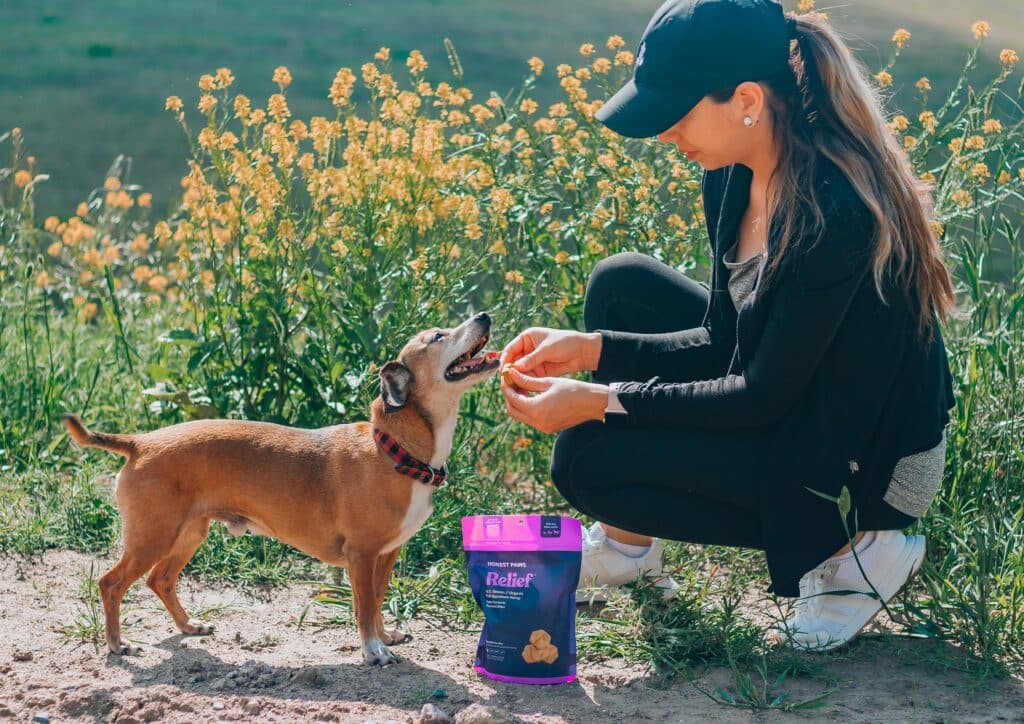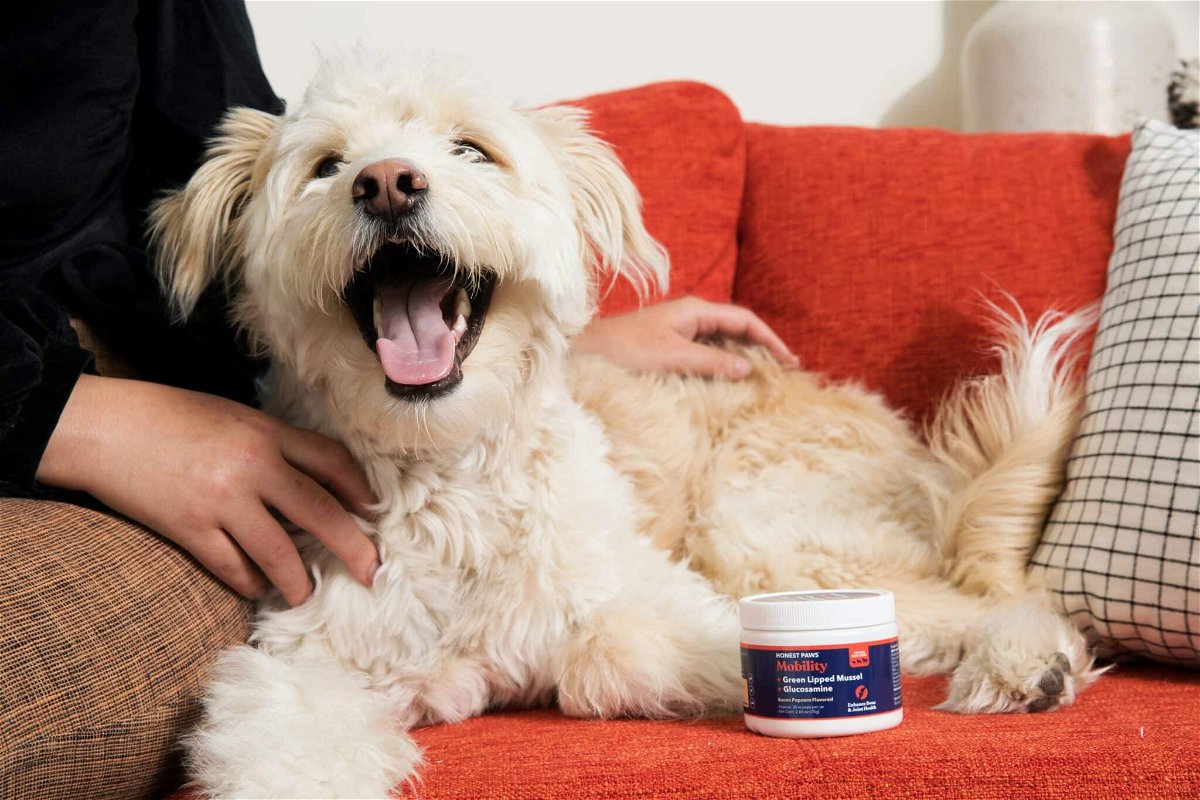We're an affiliate
We hope you love the products we recommend! Just so you know, we may collect a share of sales or other compensation from the links on this page at no additional cost to you. Thank you if you use our links, we really appreciate it!
As our canine friends age, it is common for them to start experiencing mobility issues due to their weakening joints.
Helping your pup maintain their joint health is an essential part of ensuring that you keep them healthy, happy, and active throughout the day.
This issue begs the question of what to give dogs for joint health.
In this post, we’ll explore the various options for supporting your dog’s joint health, including medications, and those which you can do at home for them.
We’ll also give a word for identifying when it’s time to start supporting your dog’s joint health and how to get the best option for your furry friend.
If you want to keep your dog moving comfortably and happily, be sure to read on for everything you need to know about improving joint health in dogs.
What Causes Joint Pain in Dogs?
Several factors can contribute to joint pain in dogs. Two of the most known causes are degenerative and developmental issues.
Degenerative joint issues will develop with time as the dog ages due to continuous wearing down of the joint cartilage or tendon injuries.
A good example of this condition is osteoarthritis which comes about due to the wear and tear of the dog’s joints as they age.

Developmental joint issues in dogs come with genetics or hereditary predisposition and may affect your dog from their puppyhood.
Other causes of joint pain in dogs may include injury, stress fracture, infection, or inflammation.
Some dog breeds may be more vulnerable to acquiring joint health problems than others. Large dog breeds, for example, have a lot of weight to place on their limb joints and this can cause a faster rate of wear and tear on the ligaments.
What to Give Dogs for Joint Health
There are several things you can do to help support your dog’s joint health. You can choose the best one that works for your pup based on examination and recommendations from your vet.
1. Dog joint supplements
One of the most effective ways to improve your dog’s joint health is to give them a supplement.
They typically contain natural ingredients such as glucosamine, chondroitin, and omega-3 fatty acids, which will help to support healthy joint function and reduce inflammation.
Glucosamine is a natural compound that is found in cartilage. It is necessary for the production of chemicals that form the cartilage, ligaments, tendons, and other joint fluids.
This compound is available as a supplement and will work in your dog’s body to support joint health and reduce inflammation.
It is commonly extracted from the shells of shellfish or formulated in the laboratory to create supplements.
Chondroitin is another natural compound found in the cartilage and it helps to keep it elastic by absorbing water into the connective tissues.
Chondroitin also works to inhibit the enzymes that may destroy the cartilage and it helps in the formation of a new one.
This compound is also available in supplement form and may help to support joint health and reduce joint pain.
Dogs need the Omega 3 fatty acids for their bodies but they cannot produce them naturally. Omega 3 helps to increase the flow of blood during exercises and this will help to reduce joint inflammation and swelling.
They also inhibit the production of certain proteins that have adverse effects on the joints. Fish oil is rich in Omega 3 fatty acids and you can also get some for your dog in supplement form.

Joint supplements for dogs can be found in many forms at the stores including chewable tablets, powder, or easy-to-chew treats.
2. Medications
Your vet may prescribe certain drugs to manage your dog’s joint pain and inflammation. Nonsteroidal anti-inflammatory drugs (NSAIDs) are the most commonly prescribed drugs for this purpose.
They work by reducing inflammation and relieving pain in your dog’s joints.
The most common FDA-approved NSAIDs that have been proven to work are Galliprant, Deracoxib, Tepoxalin, Etodolac, Carprofen, Firocoxib, and Meloxicam.
Make sure to consult with your vet on the type of drug and dosage that may be good for your dog based on their specific needs.
3. Weight management
If your dog is overweight or obese, then their joint problems might be worsened by the excess weight which puts additional stress on the already weak joint tendons.
Too much weight will only lead to increased pain and reduced mobility. Excess body fat also hurts your dog’s joint issues by increasing pain and stiffness.
Scientific studies have shown that a weight reduction of 6.10% is enough to significantly reduce the lameness caused by joint problems in obese dogs.
Your vet should advise you on the ideal weight of your dog based on the breed and size.
If your dog is found to be overweight, then you should put them on a weight reduction program to shed off the excess fat. This should always include a healthy balanced diet and regular exercises for your doggo.
4. Physical therapy
Physical therapy (physiotherapy) can be a beneficial treatment option for dogs with joint problems, such as osteoarthritis.
Physical therapy may include simple stretches and light exercises to improve the joint range of motion and strengthen the ligaments and tendons.
This can help to reduce discomfort and improve mobility with little or no reliance on medication. Increased physical activity will also aid your pup to regain their joint flexibility and maintain the ideal weight.
Your vet may recommend physical therapy as part of your dog’s treatment plan, or you may work with a canine physical therapist.
Some common physical therapy exercises for dogs with joint problems may include:
Motion exercises: These exercises will help to improve joint flexibility and mobility. Examples may include leg lifts, circles, and stretches.
Muscle strengthening exercises: These exercises help to build up the ligaments around the joints, which can aid to reduce inflammation and improve mobility.
Examples may include balance exercises, such as standing on a wobble board, and weight-bearing exercises, such as walking up stairs.
Hydrotherapy: Swimming or walking in water is a low-impact way to improve your dog’s flexibility and reduce pain in their joints.
The water buoyancy helps to hold the body and lower the strain placed on the joints hence allowing your pup to exercise with reduced pain.
It’s important to work with a veterinarian or a canine physical therapist to develop a physical therapy program that is appropriate for your dog’s specific needs and abilities.
It’s always important to start slowly and gradually increase the intensity of the exercises only when your dog can manage.
5. Diet
A good balanced healthy diet is essential to improve your dog’s joint health. We recommend that you avoid commercial foods that are made with refined grains and processed meats.
Instead, you should go for whole grains and fresh organic fruits that are safe for dogs to eat. These foods contain specific phytochemicals that will help to fight joint inflammation in your dog.
Fatty fish like salmon, sardines, and mackerel are superfoods that you should incorporate in your dog’s diet. These oily fish contain Omega 3 fatty acids which help to improve the joint health of your dog by reducing inflammation.
Meat and eggs can increase your dog’s body inflammation if taken in large quantities. Be careful when feeding your dog these foods, we recommend sticking to a few servings per portion.
Make sure that your dog’s diet is working towards reducing inflammation in their joints and maintaining a healthy weight.
You can also work with your vet to develop the perfect meal plan for your dog to keep them safe and healthy.
What Is a Good Joint Supplement for Dogs?
There are many joint supplements for dogs in the market but the best one for your pup will depend on their underlying health conditions and specific needs.
When choosing a joint supplement for your doggo, you should always look for a product that is formulated with high-quality ingredients specifically for dogs.
Some of the best ingredients that should not miss in a good joint supplement for your pup are:
- Glucosamine
- Chondroitin
- Omega-3 Fatty Acids
- MSM (methylsulfonylmethane)
These compounds work to reduce pain and inflammation in your arthritic dog through different modes of action.
What Age to Start a Dog on Joint Supplements
There is no specific age when all dogs should start on joint supplements. It’s generally a good practice to start giving your dog some joint supplements when they start showing signs of joint issues, such as limping, stiffness, licking the affected joint, or general irritability.
This can show up at any age, but it is more common in elderly dogs or those that are predisposed to joint problems due to genetics.

If your dog is at risk for developing joint problems, your vet may recommend starting a joint supplement at an earlier age, mostly 1-year-old, as a preventative measure.
It’s worth speaking to your vet before starting your dog on any supplements. They will recommend the best way to do it based on your dog’s individual needs and any other underlying health conditions they may have.
Conclusion
Maintaining the joint health of your dog is an important aspect of keeping them comfortable, healthy, and active.
On the question of what to give dogs for joint health, there are several options available to support them including medication, diet changes, and joint supplements.
Your vet is best suited to recommend what will work best for your pup depending on their specific condition and genetic predisposition.
If you’re looking for a high-quality joint health regimen for your pup, make sure to check out our top picks for the best hip and joint supplements for dogs.
Our team has researched and reviewed a wide variety of products to bring you those which have been proven to be effective.
Laura is the founder of Furs'n'Paws. She is a also a pet writer and expert with more than 20 years of experience of working with dogs and cats. She developed a very strong love for animals at a young age. Her passion led her to establish a thriving pet sitting and dog walking business in Dubai. As an expert in pet training, behavior, and nutrition, Laura is committed to helping pet owners and pet lovers by offering high-quality information on a wide range of topics.




No responses yet